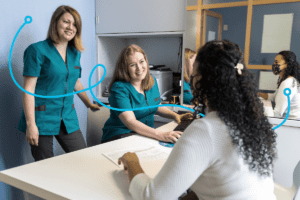Being empathic in your communications with your patients is one of the most important skills you will develop. Even when you’re feeling stressed out, it’s a good idea to put on your best face for your patients. It’s a key part in building patient satisfaction with your practice.
You want being in your office to be a good experience for your patients, and being empathetic towards them is a massive piece of that.
Why Empathy Matters?
Practicing empathetic communication in your practice has many benefits;
- It’s good for your patients – your patients will appreciate empathic communication from you. When you treat them like you hear them and understand them, they’ll feel like you really care about them.
- It’s good for the dentist – it’s been shown that practicing empathy in the workplace can help you find more meaning in your work. You may find reduced levels of burnout and an improved sense of well-being.
- It’s good for your practice – empathy helps strengthen your relationships with your colleagues. Collaboration and clinical competence often see improvement.
Let’s dive deeper into the concept of “empathy”.
What is Empathy in Patient Communications?

Empathy is defined by the Merriam-Webster Dictionary as “the ability to understand another person’s feelings, experience, etc.”. How do you implement that into your patient communication?
Some examples of a scenario where you can really be empathetic;
When a patient is in chronic pain
A patient who is in chronic pain may be desperate to find some way to alleviate it. People who live in chronic pain often feel as if others don’t take their pain seriously. Often, society views chronic pain as something that is the fault of the person suffering.
When one of your patients is in chronic pain and they come to you, the best thing you can do is listen. That may seem obvious, but it bears repeating anyways. Engage with those that need your help and show them you understand that they are in pain and that you are going to look after them.
When a patient is afraid of needles and dental tools
As a dentist, you know that the needles and tools that you use are beneficial. But you must keep in mind that a patient might feel nervous or afraid. Those tools can look pretty nasty, after all!
When this situation arises, it’s an opportunity to take a moment to let them know you understand their fear. Reassure them, help them work through their emotions.
When a patient doesn’t understand something
We have talked before about how patients, especially older patients, may have difficulty understanding various things about your practice. Whether it’s the technology you use, the treatment they are undergoing, or something else, it can be a scary time for them.
In those cases, it falls on you and your staff to be empathetic. Take the time to understand where they are coming from and to reassure them that things will be okay.
Tips for Cultivating an Empathetic Culture in Dental Practices
It’s not always easy to put yourself in someone else’s shoes. Cultivating an empathetic culture in your practice takes a bit of work. But, as we have previously discussed, it is absolutely worth your time.
Some ways you can start building that culture in your office include;
Active Listening
Active listening is as much about your body language as it is about actually listening to someone. If you look distracted – on the computer, looking for the right form, etc. – then the patient might feel as though you are not listening, even if you are.
Making eye contact is the most important part of the active listening body language. It can be a habit to stare at the medical records on the screen in front of you, but it is to your benefit.
Encouraging Patient Feedback
This goes along with the active listening part. One of the best ways to source ideas on how you can improve your service comes from the people you are serving.
Encouraging feedback, whether in the form of a suggestion box, social media reviews, or any other method, will prove that you care about what your patients think. An easy way to incorporate feedback is by automating it into your communications workflow with a software like Intiveo.
Training Staff in Empathy Skills
Remember – you’re not the only one interacting with the patient. If you have one staff member who the patient perceives as “rude” or “uncaring”, it will color their opinion on your practice as a whole.
Taking the time to train your staff in being empathetic towards your patients. Perhaps you can find an outside expert who can do a seminar, or you can just start moving in that direction on your own.
It is a process and you must be patient.
Using Patient Communication Software
Using a patient communication software, such as Intiveo, is a powerful tool in the journey towards creating a more empathetic practice.
Implementing a patient communication tool allows you to be more personalized with your messages. A feature such as two-way chat will allow you to keep the communication lines open without much effort.
The Benefits of an Empathetic Culture in Dental Practices

It should be pretty clear at this point what the benefits are for your practice;
- Improved patient satisfaction – your patients will notice your efforts and will appreciate it. They’ll feel that you truly care about them.
- Improved patient retention – when your patients are more satisfied with the care they are receiving, they are less likely to leave and seek treatment at another practice.
- Positive reviews and referrals – more satisfied patients means better online reviews. That’s good for visibility! Plus, if your patients are happy, that means they’ll be more likely to recommend your practice to friends and family.
- More successful treatment outcomes – happier patients and happier staff means better treatment outcomes.
Real-Life Examples of Empathy in Dental Patient Communications
Sheri at Boisson Dental Group noted that they are “able to have a better understanding of our patient’s wants and needs and on top of that – at least 50% of our patients are leaving positive online reviews!”. It is clear that bringing in a patient communication tool has positively impacted their ability to empathize with their patients. They have a better understanding of what their patients want and need, which means they are able to grow as a practice.
Meanwhile, Centre Dentaire Tracadie-Sheila saw a 95% patient approval rate on their new communication methods when they went with Intiveo. A high approval rate means happier patients and better outcomes for everyone.
In both cases, the use of technology was the key in helping each practice build a more empathetic connection with patients.
Conclusion

Focusing on developing an empathetic process in your practice can result in many positive outcomes. You can improve your patient experience greatly when you provide a more empathetic environment.
Active listening and encouraging feedback are things you can start working on immediately.
Intiveo can provide you with a platform to enhance your empathy and, therefore, your patient experience. Create a more personal connection that your patients will appreciate.
Improve your patient’s experience today; book a demo with Intiveo to see how we can help.






